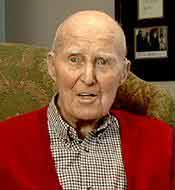
American agricultural scientist Norman Borlaug died at his home in Dallas, Texas Saturday at the age of 95. He won the Nobel Peace Prize in 1970 for his work to stop world hunger. Known around the world as the father of the Green Revolution, his effort to increase crop yields has been credited with saving millions of people from starvation.
To his friends, family and colleagues, Norman Borlaug was a marvel, continuing to work on agricultural projects and academic pursuits as he reached the age of 95. He resided in Dallas, but taught classes during the fall semester at Texas A & M University in College Station, where an institute was established in his name.
At his 95th birthday party in Dallas last March, Borlaug spoke to VOA about the need to continue expanding food production to meet the needs of a growing world population.
"We are adding 84 million people to the population every year. We have a big job on our hands," he said.
Borlaug expressed concern about a new variety of wheat stem rust attacking wheat plants in Africa and advocated greater coordination of researchers around the world to stop its spread.
His advocacy of intensive, high-yield agriculture came under criticism from environmentalists in recent years, but Borlaug and those who followed his lead argued that older methods of sustainable farming could not produce enough food to prevent hunger in poorer regions of the world.
Borlaug was born in the midwestern state of Iowa in 1914 and attended the University of Minnesota agricultural school.
In 1944, when many experts warned of mass starvation in developing nations where populations were expanding faster than crop production, Borlaug began work at a Rockefeller Foundation-funded project in Mexico to increase wheat production by developing higher-yielding varieties of the crop. By 1957, the average yield per hectare of Mexican wheat had almost doubled.
Borlaug remained involved with the International Maize and Wheat Improvement Center in Mexico, even after his research took him to other parts of the globe, where he replicated the success he had had in Mexico, building his reputation as father of the "green revolution" in the 1960s.
In addition to the Nobel Prize, Borlaug was honored with the highest civilian honors in the United States; in 1977 the Presidential Medal of Freedom, and in 2007 the Congressional Gold Medal.
In a statement Saturday through Texas A and M University, Borlaug's children said "It is the hope of the Borlaug family that his life would be an example to all. We would like his life be a model for making a difference in the lives of others and to bring about efforts to end human misery for all mankind".
marvel:奇才
high-yield:產量很高的;高產的
Related stories:
Parsley: Not just another pretty green
Growing crops with less water
Agroecology
全球一半人口到2100年將面臨糧食危機
Farmers get leeway on use of land
(Source: VOA 英語點津編輯)